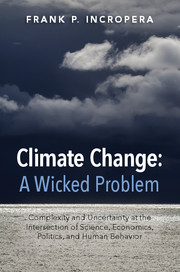 Climate Change: A Wicked Problem
Climate Change: A Wicked Problem Book contents
- Frontmatter
- Dedication
- Contents
- Foreword by Anthony F. Earley Jr.
- Foreword by G.P. “Bud” Peterson
- Foreword by Arun Majumdar
- Preface
- Acknowledgments
- Abbreviations
- 1 Energy, economics, and climate change
- 2 The Earth's climate system
- 3 Greenhouse gases
- 4 Global warming
- 5 Consequences of global warming
- 6 Mitigation, adaptation, and geoengineering
- 7 Public policy options
- 8 The politics of global warming: a history lesson and future prospects
- 9 Dissenting opinions: the great hoax
- 10 The ethics of climate change
- 11 A way forward
- Appendix A Units and conversion factors
- Appendix B Fossil fuels
- Appendix C Anthropogenic sources of natural gas and methane
- Appendix D Environmental time scales and inertia
- Appendix E Coal-fired power plants: operating conditions and costs of carbon capture and sequestration
- Notes
- References
- Index
- Plate section
4 - Global warming
Published online by Cambridge University Press: 05 October 2015
- Frontmatter
- Dedication
- Contents
- Foreword by Anthony F. Earley Jr.
- Foreword by G.P. “Bud” Peterson
- Foreword by Arun Majumdar
- Preface
- Acknowledgments
- Abbreviations
- 1 Energy, economics, and climate change
- 2 The Earth's climate system
- 3 Greenhouse gases
- 4 Global warming
- 5 Consequences of global warming
- 6 Mitigation, adaptation, and geoengineering
- 7 Public policy options
- 8 The politics of global warming: a history lesson and future prospects
- 9 Dissenting opinions: the great hoax
- 10 The ethics of climate change
- 11 A way forward
- Appendix A Units and conversion factors
- Appendix B Fossil fuels
- Appendix C Anthropogenic sources of natural gas and methane
- Appendix D Environmental time scales and inertia
- Appendix E Coal-fired power plants: operating conditions and costs of carbon capture and sequestration
- Notes
- References
- Index
- Plate section
Summary
We know that atmospheric GHG concentrations have been increasing for more than two centuries in concert with increasing GHG emissions. We also know that increasing GHG concentrations create a positive radiative forcing that reduces the outflow of thermal radiation from the Earth to outer space. Hence, with little change in solar radiation, the global radiation balance is disrupted by a net transfer of radiation to the Earth, whose temperature must then increase until a balance between the radiative inflows and outflows is restored.
Our confidence in the validity of the foregoing assertions is rock solid. But to what extent has the Earth's temperature increased, and how much will it increase in years to come? The first question is answered by temperature records, the second by the use of climate models.
The Earth's temperature history
Proxy and instrument records
Since the early nineteenth century, temperatures at the Earth's surface and lower atmosphere have been obtained from direct measurements, beginning with the use of thermometers and progressing to more sophisticated electronic and radiometric sensors. Such measurements comprise what's known as the instrument record. For earlier periods attempts to reconstruct the Earth's temperature history rely on proxy data obtained from paleoclimatic artifacts such as tree rings, ice cores, marine sediments, and sea coral. Although the data track past climate conditions and natural variability of the Earth's surface temperature, it is tied to discrete places and times and is by no means complete or without uncertainty. To a lesser extent, the same can be said of the instrument record.
Although the instrument record provides data from thousands of weather stations and seagoing vessels around the world, gaps exist in both space and time. Conditions around a weather station can also change over time due to land development practices, or the site itself can change, as can the instruments used for the measurements. Such variations must be reconciled before the measurements can be used to determine changes in the global or hemispheric average temperature over time. Different approaches can be taken to the reconciliation process, commonly termed homogenization, and to interpretation of the results.
Information
- Type
- Chapter
- Information
- Climate Change: A Wicked ProblemComplexity and Uncertainty at the Intersection of Science, Economics, Politics, and Human Behavior, pp. 55 - 79Publisher: Cambridge University PressPrint publication year: 2015